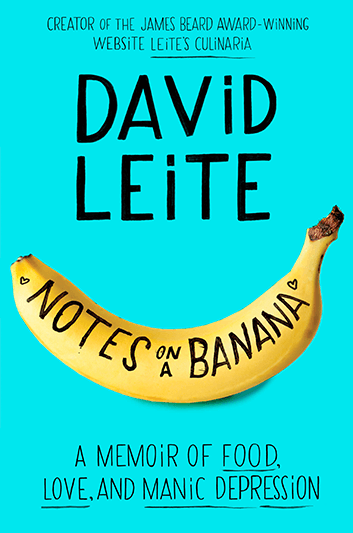
“Diagnosis: Mental Lite!” — Chapter 33 of David Leite’s self-deprecating Notes on a Banana: A Memoir of Food, Love, and Manic Depression — reminded me of the two decades it took before I was diagnosed bipolar type 2.
For twenty-five years Leite was treated (unsuccessfully) for depression and anxiety. Like Leite, I was an overachiever who cyclically crashed. From eighteen to thirty-nine, I was diagnosed dysthymic (chronically depressed). Finally as a mother of a toddler, I recognized my euphoric callings from God as symptoms of hypomania and called for help.
After seeing numerous psychiatrists since he was fourteen, Leite sought and got an accurate diagnosis of bipolar II from Neil De Senna, who at the time was a Columbia University Medical Center professor of psychiatry.
Here I excerpt as bullet points the questions Dr. De Senna asked that led to Leite’s diagnosis. Buy the book to read his life story and answers to these questions — you won’t regret it.
- Did I ever have rapid, repetitive thinking?
- Did I ever talk fast, sometimes so fast people couldn’t understand me?
- Had I ever been so irritable, I shouted at people or started fights or became violent?
- Had I ever had a decreased need for sleep? If I slept just a few hours, did I feel great?
- Did I ever engage in risky behavior that endangered my life?
- Had I felt unusually self-confident in myself and my abilities? Did I ever experience grandiosity?
- Had I ever had morose, violent thoughts?
- Had I ever contemplated suicide? Had I ever attempted it?
- Had I ever lost interest in things because nothing gave me pleasure?
- Were there times when I was very interested in being with people, and other times when I wanted to be alone?
- Did I have crying jags, anxiety and panic, trouble falling asleep or staying asleep, bad feelings about myself?
Now I quote without editing, De Senna’s description of bipolar I and bipolar II:
He explained that there are two types of bipolar disorder. Bipolar I is the more severe form, what Kay Redfield Jamison, the author of An Unquiet Mind, has. In it, the manias are screechingly amped up and oftentimes dangerous. They’re emblazoned with inflated self-esteem and billowing grandiosity, a marked decrease in sleep, a pressing need to talk, sometimes with odd features such as “clanging,” where speech loses meaning and follows a pattern of rhymes or sounds. Someone suffering from full-blown mania can be grossly distracted; battle racing, looping thoughts; and engage in potentially dangerous and deadly activities, such as unchecked buying sprees, risky or anonymous sex, foolish business dealings, and reckless driving. All the while, psychosis—a disconnection from reality—can be skulking in the background, just waiting for a pause, an opening. These manias can disrupt a person’s life to such a degree that jobs are lost, relationships implode, families disintegrate. Hospitalizations usually follow.
“What you have, bipolar II,” he continued, “is a milder form of the illness.” While the depressions can be just as deep and disabling, disabling, he said, what makes the difference is the quality, degree, and length of the high times. With bipolar II, a person suffers from hypomania. Elevated, expansive moods that are seductively attractive to the sufferer and the people around him, hypomanias are a watercolor version of bright-neon manias. Through it all, life isn’t disrupted to the same degree, and there’s never a psychotic break. Hospitalizations aren’t common.
“It can be very, very difficult to diagnosis hypomania,” Neil said. “Especially in type-A people who are normally goal-oriented, high energy, and creative. Their personalities can mask the illness at times.”
By quoting from David Leite’s memoir, published by HarperCollins, I do not intend to avoid copyright law. My hope is to educate, and as an added bonus to Leite and HarperCollins, to promote a great memoir of a creative soul living with manic depression.

Leave a Reply